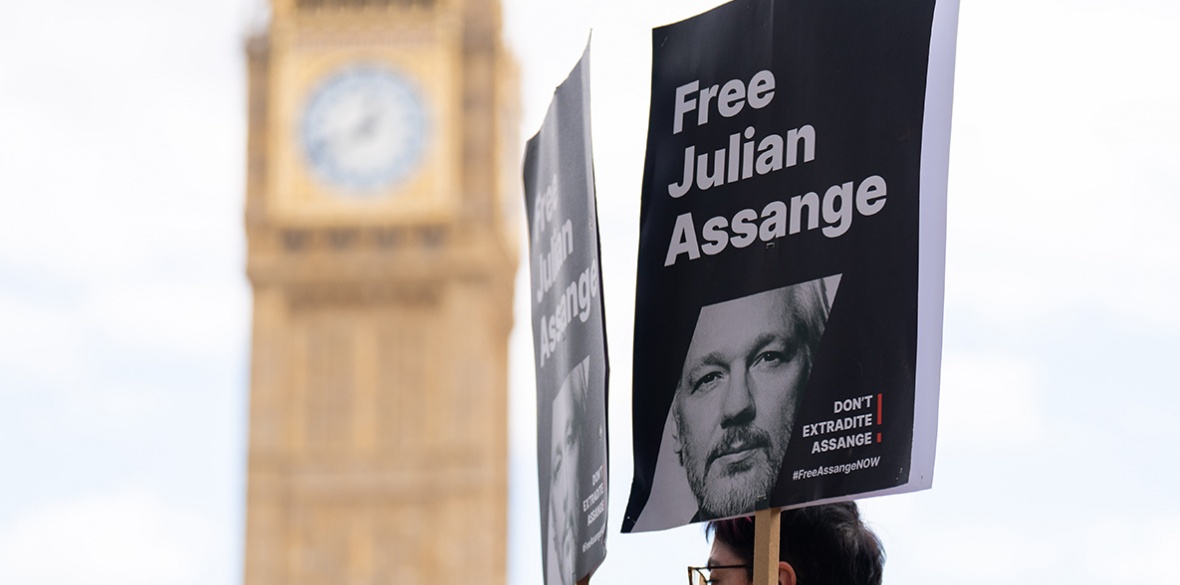This is the last article you can read this month
You can read more article this month
You can read more articles this month
Sorry your limit is up for this month
Reset on:
Please help support the Morning Star by subscribing here
WIKILEAKS founder Julian Assange’s appeal against extradition to the United States will be heard in the High Court on Tuesday in a final leg of the legal battle for free journalism.
Mr Assange, who exposed US war crimes in Iraq and leaked thousands of military secrets, will face court on Tueday and Wednesday.
He is wanted by US authorities on 18 counts, relating to WikiLeaks’ publication of hundreds of thousands of classified documents.
Mr Assange has been in Belmarsh prison since he was removed from the Ecuadorian embassy in 2019 where he was given political asylum for nearly seven years.
If Mr Assange is denied permission to appeal, he will be at risk of extradition to the US and prosecution under the century-old 1917 Espionage Act, and faces a 175-year prison sentence.
Mr Assange’s wife Stella says that her husband would not survive the extradition.
The US gave “diplomatic assurances” that Mr Assange will not be placed in conditions that could amount to ill-treatment, after a judge previously blocked his extradition to the US because the suicide risk was too high.
But Amnesty International warned that the assurances were “not worth the paper they’re written on.”
“If a state is violating human rights to the extent that people are at risk of torture, then it’s not a state that can be trusted to give assurances that it won’t torture somebody,” said Simon Crowther, a legal adviser for the human rights group.
Speaking to ABC today, Ms Assange said [the assurances] were “a licence to put Julian in precisely the types of conditions the court said would drive him to commit suicide.”
Mr Crowther said the case was “very significant for the ramifications for press freedom.
“This opens a floodgate, where in effect, it will send a chill down the spine of editors in newsrooms the world over because they would have to worry that their journalists could face prosecution if they uncover state secrets.”
John Rees, of the Free Assange campaign, also warned: “No-one who wants to reveal secret information of governments to the wider public, even if they have an absolutely rock-solid public interest defence, will be safe.
“What the American prosecution does is extend the US Espionage Act to cover journalists — journalists who aren’t American citizens and weren’t in America when they published the material.
“It extends the use of the Espionage Act internationally, when there’s no similar extension of First Amendment rights to a free press.”
NUJ assistant general secretary Seamus Dooley warned that journalists must not be forced into a “culture of fear” that will “no doubt impact investigative journalism and press freedom.
“These actions by state authorities serve to undermine the work of every journalist seeking to expose wrongdoing, no matter where they operate.“
More concerns were flagged after Declassified revealed today that one of the two High Court judges who will rule on Mr Assange’s bid to stop his extradition to the US represented Britain’s Secret Intelligence Service and the Ministry of Defence.
Records show that Justice Jeremy Johnson was paid by the Government Legal Department twice for his services in 2018.
Hundreds of supporters will be protesting outside High Court in London on Tuesday and Wednesday from 8.30am during the trial.
At the end of the hearing on the second day they will march to Downing Street.









